Celltrion’s approved merger removes hurdle to three-way combination
Chairman Seo, who has returned to work after a two-year hiatus, vows to turn the biosimilar player into a global drugmaker
By Oct 23, 2023 (Gmt+09:00)
LG Chem to sell water filter business to Glenwood PE for $692 million


Kyobo Life poised to buy Japan’s SBI Group-owned savings bank


KT&G eyes overseas M&A after rejecting activist fund's offer


StockX in merger talks with Naver’s online reseller Kream


Mirae Asset to be named Korea Post’s core real estate fund operator


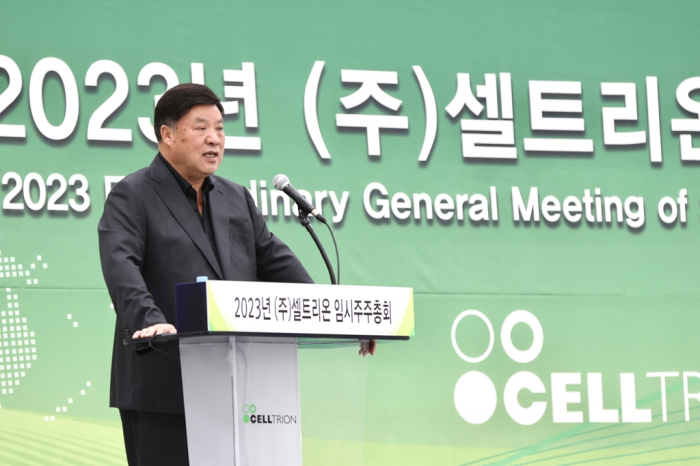
South Korea’s biosimilar drugmaker Celltrion group on Monday moved one step closer to the planned combination of its three major affiliates with shareholders of Celltrion Inc. and Celltrion Healthcare Co. overwhelmingly approving the merger of the two.
Under the plan, pharmaceuticals developer Celltrion Inc. will absorb Celltrion Healthcare, its global sales and marketing affiliate.
The merged entity will launch on Dec. 28.
The merger will be conducted at Celltrion Inc.’s share price of 148,853 won and Celltrion Healthcare’s share price of 66,874 won. Celltrion Healthcare’s shareholders will receive 0.449 in the newly merged company’s stock for each Celltrion Healthcare share they own.
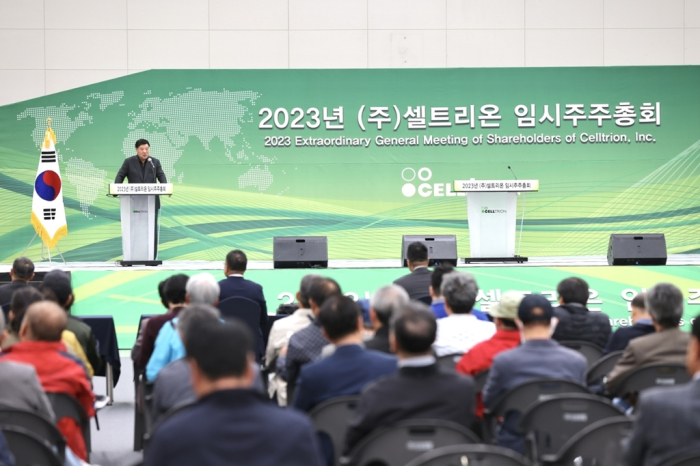
Those who oppose the merger can ask the two companies to buy back their shares at 150,813 won a share for Celltrion Inc. and 67,251 won for Celltrion Healthcare until Nov. 13.
Celltrion Group said it has set aside 1 trillion won ($739 million) to prepare for share buyback requests.
Following the merger news, shares of Celltrion Inc. fell 1.1% on Monday to close at 140,600 won while Celltrion Healthcare closed down 1.4% at 62,600 won. The broader benchmark Kospi index ended 0.8% lower.
NPS OPPOSES CELLTRION-HEALTHCARE MERGER
Korea’s state-run pension fund, the National Pension Service (NPS), which owns 10.88 million Celltrion Inc. shares worth a 7.43% stake, abstained from the vote on Monday, virtually opposing the merger. The NPS' stake makes it Celltrion’s second-largest shareholder.
If the pension fund exercises its right to demand the company buy its entire stake, it will cost Celltrion about 1.64 trillion won.
“The stock purchase rights limit is set at 1 trillion won. But if demand exceeds the limit, we’ll buy them all. If we have to take on debt, we will do so to meet all requests,” said Celltrion Group founder and Chairman Seo Jung-jin. “We’ll remove all uncertainty surrounding our merger plan.”
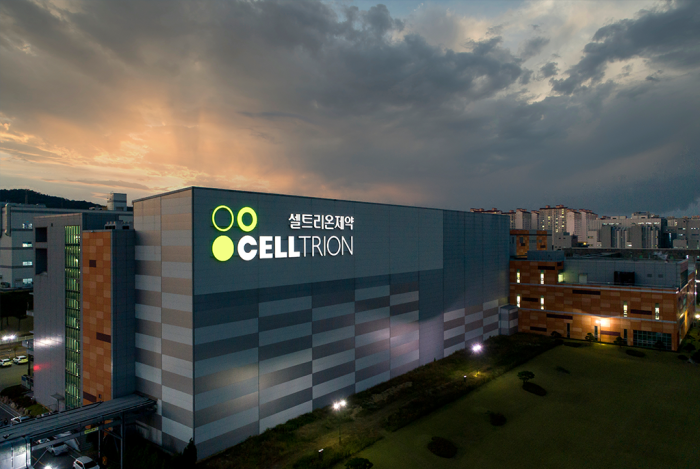
Once the merger of the two affiliates is complete, the group plans to combine it with another subsidiary Celltrion Pharm Inc. a domestic distribution unit, within six months.
In August, Celltrion Group said that it was kicking off merger procedures after receiving approval on the plan from the two companies’ boards of directors to cut costs, create synergy and enhance business transparency.
The group was accused of accounting and audit rules violations as well as intra-group transactions in 2018 and fined 13 billion won by Korea's Financial Services Commission (FSC) in March 2022. Chairman Seo said that the merger will address these transaction issues and enhance the group's business transparency.
Earlier this month, Institutional Shareholder Services (ISS) Inc., a global proxy advisory firm, expressed its support for the merger of the two Celltrion affiliates, urging foreign investors to vote for it.
ISS said the merger would allow the two affiliates to use a more flexible strategy for pricing within the integrated value chain, and help the group achieve its financial goals.
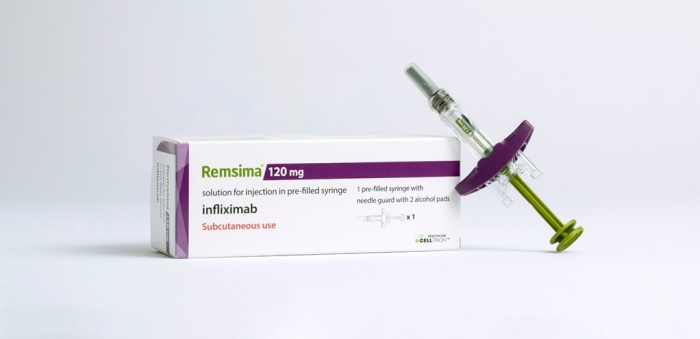
The Celltrion group aims to achieve 12 trillion won in revenue in 2030 by boosting sales in biosimilars and new drugs and saving costs through mergers. Last year, the group logged 2.28 trillion won in revenue and 647.1 billion won in operating profit.
RETURN OF CHAIRMAN SEO
In March, Chairman Seo returned to management two years after his departure, pledging to merge the group affiliates, seek overseas acquisitions for global expansion and secure technology for new drugs.
Celltrion has long been a leading biosimilar player, producing replicas of original drugs, a growing market in the pandemic era.
On Monday, Celltrion said it obtained approval from the US FDA on Remsima SC, the world’s first subcutaneous injection of infliximab that targets immune-system diseases like rheumatoid arthritis.
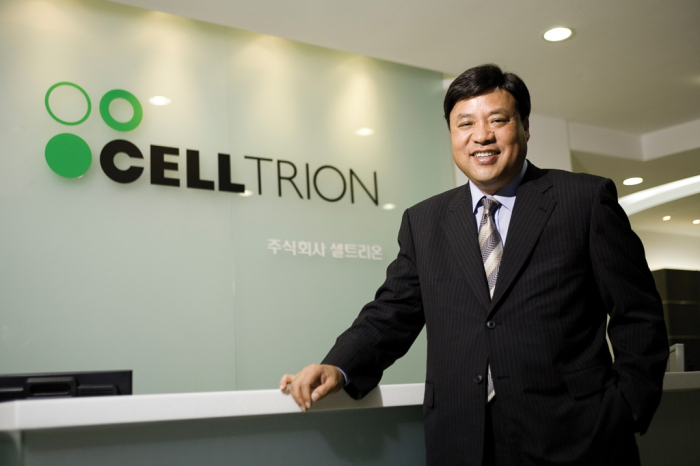
The biosimilar, to be sold under the Zymfentra brand in North America, is Celltrion's first new drug approved by the FDA.
Celltrion expects more than 3 trillion won in sales revenue from Zymfentra in the US over the next three years.
In reference to the FDA approval of Remsima and the merger of the two affiliates, Seo said: “We passed two major milestones today.”
HOLDING FIRM TO GO PUBLIC
Currently, Chairman Seo has 98.1% of Celltrion Holdings Co., which in turn owns Celltrion Inc. and Celltrion Healthcare with 20.1% and 24.3% stakes, respectively. Celltrion Inc. has a 54.8% stake in Celltrion Pharm.
Following the merger of Celltrion Inc. and Celltrion Healthcare, the holding firm will own 21.5% of the merged entity.
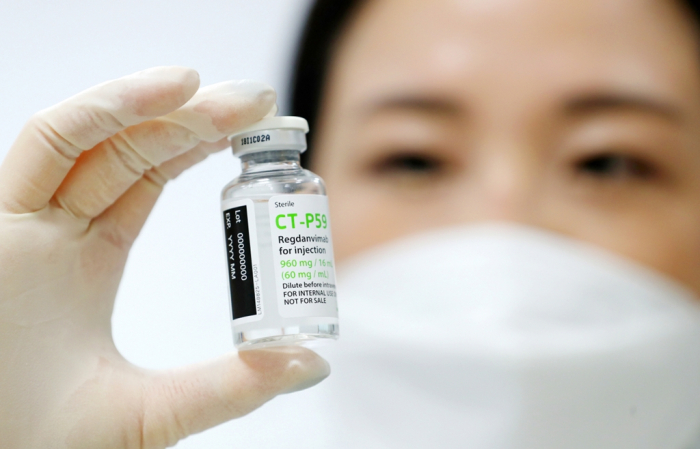
The chairman said he plans to list the holding firm on the Korea Exchange once the combination of the three affiliates is completed.
The biosimilar giant aims to become a new drug developer for long-term profit. Seo said the group plans to achieve 40% of its sales from new biopharmaceutical and chemical drugs by 2030, lowering the biosimilars’ proportion to 60% from the current 84%.
He said the group will spend heavily to expand its cancer drug pipeline beyond blood cancer treatment Truxima, breast cancer medication Herzuma as well as its monoclonal antibody biosimilar Remsima.
As part of efforts to raise funds, it has put Japanese Takeda Pharmaceutical Co.'s primary care assets it acquired in 2020 up for sale.
Write to Yoo-Rim Kim and Jeong-Min Nam at youforest@hankyung.com
In-Soo Nam edited this article.
-

-
 Bio & PharmaProxy adviser ISS backs drug giant Celltrion's merger plan
Bio & PharmaProxy adviser ISS backs drug giant Celltrion's merger planOct 06, 2023 (Gmt+09:00)
3 Min read -
 Bio & PharmaCelltrion considers listing holding firm after merger of 3 units
Bio & PharmaCelltrion considers listing holding firm after merger of 3 unitsAug 24, 2023 (Gmt+09:00)
2 Min read -
 Bio & PharmaCelltrion puts Takeda’s assets up for sale after 3 years
Bio & PharmaCelltrion puts Takeda’s assets up for sale after 3 yearsJun 18, 2023 (Gmt+09:00)
3 Min read -
 Bio & PharmaCelltrion’s Remsima SC praised in Europe as preferred biosimilar
Bio & PharmaCelltrion’s Remsima SC praised in Europe as preferred biosimilarJun 02, 2023 (Gmt+09:00)
2 Min read -
 Bio & PharmaCelltrion to sell biosimilar products via its own channel in Europe
Bio & PharmaCelltrion to sell biosimilar products via its own channel in EuropeMay 11, 2022 (Gmt+09:00)
2 Min read -
 BiotechCelltrion looks beyond biosimilars to develop its own mRNA drugs
BiotechCelltrion looks beyond biosimilars to develop its own mRNA drugsNov 16, 2021 (Gmt+09:00)
4 Min read -
 COVID-19Celltrion says COVID-19 antibody kills virus within 5 days; shares surge
COVID-19Celltrion says COVID-19 antibody kills virus within 5 days; shares surgeNov 11, 2020 (Gmt+09:00)
2 Min read


